Sarah Retter ENGLISH IRREGULAR VERBS FOR BEGINNERS 14O English irregular verbs with phrase examples The most frequently used English irregular verbs for better understanding and quick learning. Focus your English learning on the most used English irregular verbs. 2022 by Sarah Retter
2022 by UNITEXTO
Todos los derechos reservados Publicado por UNITEXTO  ENGLISH: IRREGULAR VERBS FOR SPANISH SPEAKERS
ENGLISH: IRREGULAR VERBS FOR SPANISH SPEAKERS
|
|
|
| hunde | sienta | mata | duerme | desliza |
| Wake |
VERBS AND PHRASES WITH LINE-BY LINE TRANSLATION
| Simple Present Presente simple | Past Simple Pasado simple | Past Participle Participio pasado |
| arise | Arose | arisen |
The water arises from the lake. The water arose from the lake. The water has arisen from the lake.
| Simple Present Presente simple | Past Simple Pasado simple | Past Participle Participio pasado |
| awake | awoke | awoken |
They awake in their homes.
They awoke in their homes. They have awoken in their homes.
| Simple Present Presente simple | Past Simple Pasado simple | Past Participle Participio pasado |
| is | was | been |
He is tired. He was tired. He has been tired.
| Simple Present Presente simple | Past Simple Pasado simple | Past Participle Participio pasado |
| bear | bore | borne |
I bear this curse.
I bore this curse. I have borne this curse homes.
| Simple Present Presente simple | Past Simple Pasado simple | Past Participle Participio pasado |
| beat | beat | beaten |
He beat the door. He beat the door. He has beaten the door.
| Simple Present Presente simple | Past Simple Pasado simple | Past Participle Participio pasado |
| become | became | become |
I become a police officer.
I became a police officer. I have become a police officer.
| Simple Present Presente simple | Past Simple Pasado simple | Past Participle Participio pasado |
| begin | began | begun |
The rains begin on Monday. The rains began on Monday. The rains have begun on Monday.
| Simple Present Presente simple | Past Simple Pasado simple | Past Participle Participio pasado |
| bend | bent | bent |
The blow bends the metal.
The blow bent the metal. The blow has bent the metal.
| Simple Present Presente simple | Past Simple Pasado simple | Past Participle Participio pasado |
| bet | bet | bet |
I bet you can make it. I bet you can make it. I have bet you can make it.
| Simple Present Presente simple | Past Simple Pasado simple | Past Participle Participio pasado |
| bite | bit | bitten |
The dog bites the girl.
The dog bit the girl. The dog has bitten the girl.
| Simple Present Presente simple | Past Simple Pasado simple | Past Participle Participio pasado |
| bleed | bled | bled |
They bleed from their noses. They bled from their noses. They have bled from their noses.
| Simple Present Presente simple | Past Simple Pasado simple | Past Participle Participio pasado |
| blow | blew | blown |
The kid blows the candles.
The kid blew the candles. The kid has blown the candles.
| Simple Present Presente simple | Past Simple Pasado simple | Past Participle Participio pasado |
| break | broke | broken |
He brakes the lock. He broke the lock. He has broken the lock.
| Simple Present Presente simple | Past Simple Pasado simple | Past Participle Participio pasado |
| bring | brought | brought |
She brings me coffee.
She brought me coffee. She has brought me coffee.
| Simple Present Presente simple | Past Simple Pasado simple | Past Participle Participio pasado |
| build | built | built |
I build houses for a living. I built houses for a living. I have built houses for a living.
| Simple Present Presente simple | Past Simple Pasado simple | Past Participle Participio pasado |
| burn | burned/burnt | burned/burnt |
They burn the meat They burned the meat They have burned the meat
| Simple Present Presente simple | Past Simple Pasado simple | Past Participle Participio pasado |
| burst | burst | burst |
The cars burst into flames.
The cars burst into flames. The cars have burst into flames.
| Simple Present Presente simple | Past Simple Pasado simple | Past Participle Participio pasado |
| buy | bought | bought |
I buy for my family. I bought for my family. I have bought for my family.
| Simple Present Presente simple | Past Simple Pasado simple | Past Participle Participio pasado |
| catch | caught | caught |
She catches bugs as a hobby.
She caught bugs as a hobby. She has caught bugs as a hobby.
| Simple Present Presente simple | Past Simple Pasado simple | Past Participle Participio pasado |
| choose | chose | chosen |
I choose the red dress. I chose the red dress. I had chosen the red dress.
| Simple Present Presente simple | Past Simple Pasado simple | Past Participle Participio pasado |
| cling | clung | clung |
He clings to her all day.
He clung to her all day. He has clung to her all day .
| Simple Present Presente simple | Past Simple Pasado simple | Past Participle Participio pasado |
| come | came | come |
They come home late. They came home late. They have come home late.
| Simple Present Presente simple | Past Simple Pasado simple | Past Participle Participio pasado |
| cost | cost | cost |
This costs a lot of money.
This cost a los of money. This has cost a lot of money.
| Simple Present Presente simple | Past Simple Pasado simple | Past Participle Participio pasado |
| creep | crept | crept |
He creeps out of sigh . He crept out of sight. He has crept out of sight.
| Simple Present Presente simple | Past Simple Pasado simple | Past Participle Participio pasado |
| cut | cut | cut |
I cut my finger.
I cut my finger. I have cut my finger.
| Simple Present Presente simple | Past Simple Pasado simple | Past Participle Participio pasado |
Next page
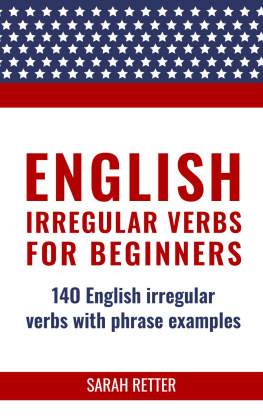


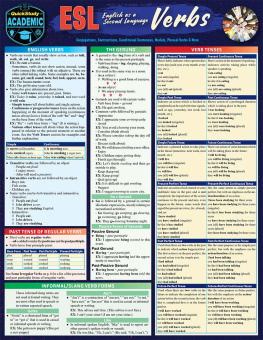
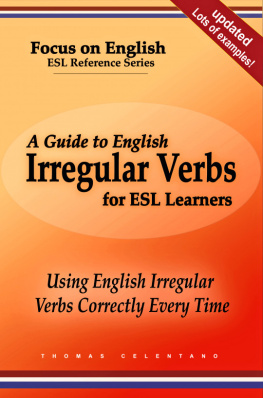
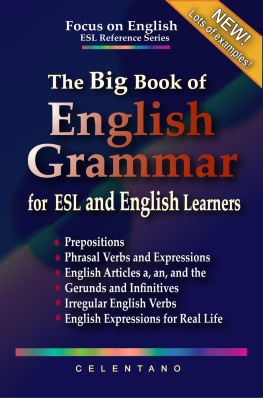
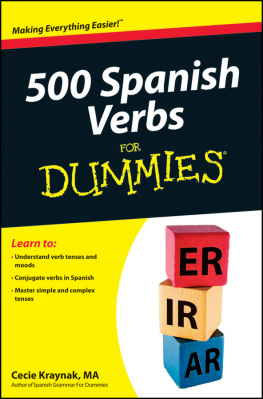
 ENGLISH: IRREGULAR VERBS FOR SPANISH SPEAKERS
ENGLISH: IRREGULAR VERBS FOR SPANISH SPEAKERS